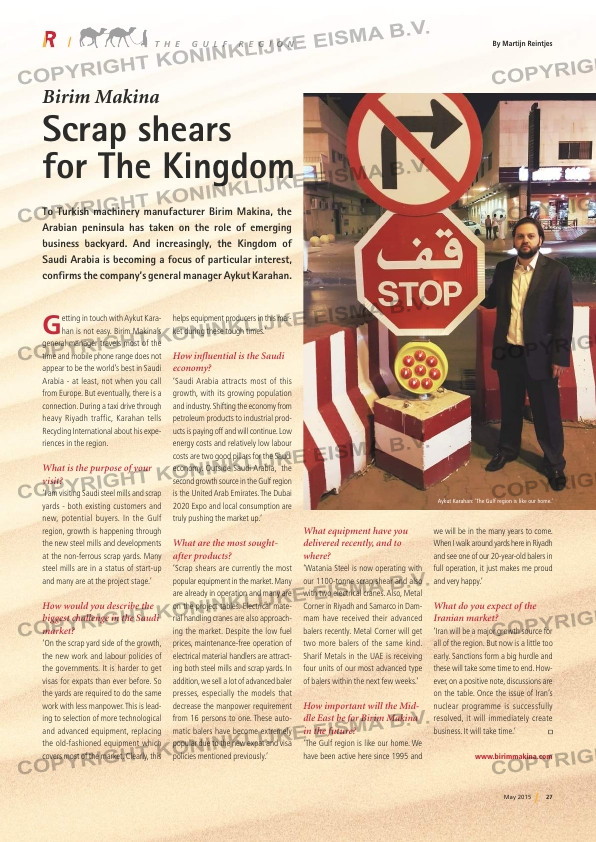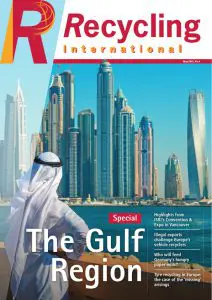Page 27 from: May 2015

27May 2015
Getting in touch with Aykut Kara-han is not easy. Birim Makina’s
general manager travels most of the
time and mobile phone range does not
appear to be the world’s best in Saudi
Arabia – at least, not when you call
from Europe. But eventually, there is a
connection. During a taxi drive through
heavy Riyadh traffic, Karahan tells
Recycling International about his expe-
riences in the region.
What is the purpose of your
visit?
‘I am visiting Saudi steel mills and scrap
yards – both existing customers and
new, potential buyers. In the Gulf
region, growth is happening through
the new steel mills and developments
at the non-ferrous scrap yards. Many
steel mills are in a status of start-up
and many are at the project stage.’
How would you describe the
biggest challenge in the Saudi
market?
‘On the scrap yard side of the growth,
the new work and labour policies of
the governments. It is harder to get
visas for expats than ever before. So
the yards are required to do the same
work with less manpower. This is lead-
ing to selection of more technological
and advanced equipment, replacing
the old-fashioned equipment which
covers most of the market. Clearly, this
helps equipment producers in this mar-
ket during these tough times.’
How influential is the Saudi
economy?
‘Saudi Arabia attracts most of this
growth, with its growing population
and industry. Shifting the economy from
petroleum products to industrial prod-
ucts is paying off and will continue. Low
energy costs and relatively low labour
costs are two good pillars for the Saudi
economy. Outside Saudi Arabia, the
second growth source in the Gulf region
is the United Arab Emirates. The Dubai
2020 Expo and local consumption are
truly pushing the market up.’
What are the most sought-
after products?
‘Scrap shears are currently the most
popular equipment in the market. Many
are already in operation and many are
on the project tables. Electrical mate-
rial handling cranes are also approach-
ing the market. Despite the low fuel
prices, maintenance-free operation of
electrical material handlers are attract-
ing both steel mills and scrap yards. In
addition, we sell a lot of advanced baler
presses, especially the models that
decrease the manpower requirement
from 16 persons to one. These auto-
matic balers have become extremely
popular due to the new expat and visa
policies mentioned previously.’
What equipment have you
delivered recently, and to
where?
‘Watania Steel is now operating with
our 1100-tonne scrap shear and also
with two electrical cranes. Also, Metal
Corner in Riyadh and Samarco in Dam-
mam have received their advanced
balers recently. Metal Corner will get
two more balers of the same kind.
Sharif Metals in the UAE is receiving
four units of our most advanced type
of balers within the next few weeks.’
How important will the Mid-
dle East be for Birim Makina
in the future?
‘The Gulf region is like our home. We
have been active here since 1995 and
we will be in the many years to come.
When I walk around yards here in Riyadh
and see one of our 20-year-old balers in
full operation, it just makes me proud
and very happy.’
What do you expect of the
Iranian market?
‘Iran will be a major growth source for
all of the region. But now is a little too
early. Sanctions form a big hurdle and
these will take some time to end. How-
ever, on a positive note, discussions are
on the table. Once the issue of Iran’s
nuclear programme is successfully
resolved, it will immediately create
business. It will take time.’
www.birimmakina.com
T H E G U L F R E G I O N By Martijn Reintjes
Birim Makina
To Turkish machinery manufacturer Birim Makina, the
Arabian peninsula has taken on the role of emerging
business backyard. And increasingly, the Kingdom of
Saudi Arabia is becoming a focus of particular interest,
confirms the company’s general manager Aykut Karahan.
Scrap shears
for The Kingdom
Aykut Karahan: ‘The Gulf region is like our home.’
RI 4-ME_Birim Makina.indd 27 30-04-15 14:44



